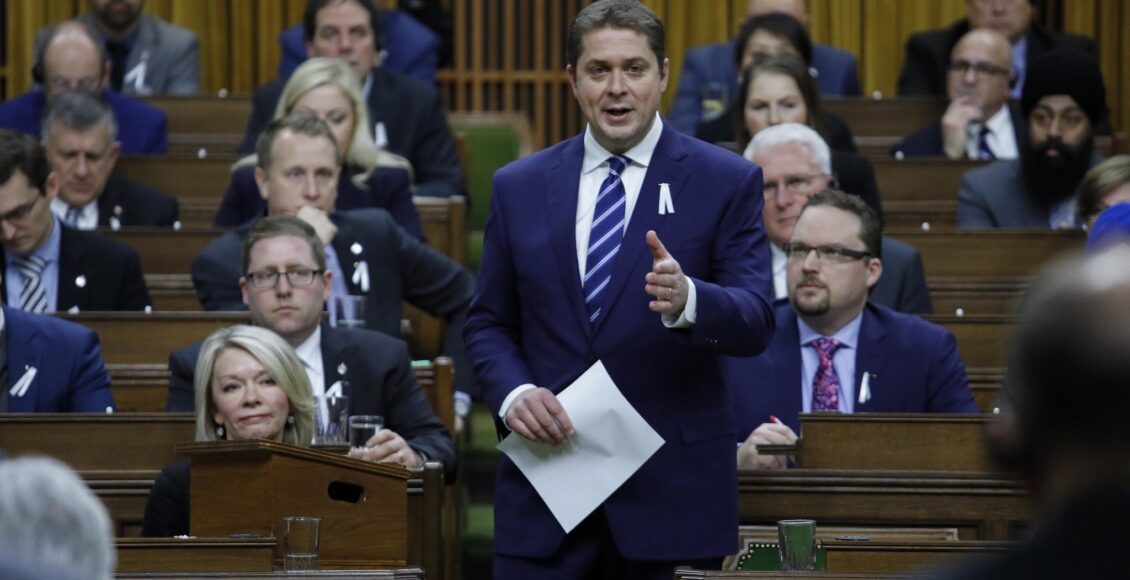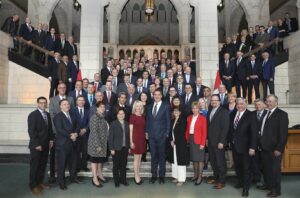Opinion | How a Tongue-tied Tory Party Will be its Ruin

This week, the Tories will select one of four declared candidates to succeed Andrew Scheer to the party’s leadership, with the contest having been postponed from June due to COVID-19. This time around, the ballot is evenly split between avowed social conservatives Leslyn Lewis and Derek Sloan, and the more old-guard Progressive Conservative campaigns of Peter MacKay and Erin O’Toole. MacKay appears to be the clear frontrunner of these candidates, according to a recent poll from 338Canada, likely due to his greater national profile as a Harper-era cabinet minister.
MacKay promises to be a unifying leader for the party, eschewing the traditional labels that he claims have divided its members in an effort to expand Conservative appeal before the next federal election. This approach is likely a response to the character of Scheer’s clandestine social conservatism, which, though it did not penetrate the official Tory platform, was blamed for the party’s loss in 2019. MacKay himself furthered this view, claiming Scheer’s personal beliefs hung around his neck like a “stinking albatross,” botching an election rife with controversy surrounding Prime Minister Justin Trudeau.
For the duration of Scheer’s tenure, and throughout this leadership election, in particular, the Conservative Party has made clear that it is hardly a forum to discuss social conservative policy. Scheer’s stifled leadership style is only the most recent reflection of a party seeking to distance itself from social conservatism by tip-toeing around social issues. However, by providing a vague social platform left open to interpretation by all, the Conservative Party might only alienate socially conservative and moderate voters, which it needs to form government.

From its founding in 2003, the Conservative Party’s electoral strategy has been one of addition by subtraction, whereby social conservatives are perennially discarded to attract the more moderate, potential Conservative voters who outnumber them. This strategy is not uncommon under a first-past-the-post electoral system. According to economist Anthony Downs, parties will often seek ideological consensus over distinction through centrist appeals to the largest possible number of voters. However, the adoption of a lackluster social policy by the Tories cannot be blamed solely on electoral circumstances, as it is rooted in the history of Canadian conservatism more generally.
Tory ambitions in Canada have always been primarily fiscal at the expense of a comprehensive social policy, creating a climate where social conservatives are seen as a dispensable group. This tendency creates a situation where more progressive attitudes on social issues are voiced in an echo chamber without opposition, leading to unsavoury policy outcomes for both moderates and social conservatives as a combined majority. Take, for instance, the debates surrounding abortion leading up to the Supreme Court’s 1988 decision in R v. Morgentaler, which made the practice more widely available by striking down Criminal Code restrictions according to the Charter.
While Brian Mulroney was willing to put his foot down as a staunch supporter of free trade against the protectionist policies of Liberal leader John Turner in the 1988 election, he offered so much as a toe on abortion. What resulted is our current situation where no legal restrictions on abortion exist whatsoever in Canada, a unique distinction on the world stage. Under his new Tory banner, Stephen Harper was also reluctant to address the topic, shooting down a motion requesting that a committee determine when human life begins. As such, he made clear that “no Conservative MP shall endeavour to make [abortion] a matter of parliamentary business.”
The reluctance of Mulroney, Harper, and most recently, Andrew Scheer to address social issues, instead favouring pure fiscal policy, has rendered the abortion debate settled by default. Meanwhile, according to recent polling data, only 18 per cent of Canadians believe that life begins at birth, with 53 per cent of those surveyed stating that life begins in the first trimester. However, without a voice in Parliament, any dialogue on the matter has been replaced with one-sided accusations of “backsliding” when raised publicly, making it harder to affect partisan change. As it stands, both Peter MacKay and Erin O’Toole have promised to vote against legislation restricting abortion in any capacity should they become their party’s leader, a move that would only further this trend.
An issue that has faced similar treatment by the Conservative Party is that of immigration. During the Harper years, Canada witnessed its largest increase in immigration until that point, with Justin Trudeau nearly doubling that amount since 2015. Again, Scheer has been ambivalent on the issue as leader, attempting to please both social conservatives and moderates by narrowly focusing on irregular border crossings. However, most Canadians believe the federal government should limit immigration, a statistic that prompted immigration minister Ahmed Hussen to voice his concern. Regardless, only Derek Sloan has promised to reduce target immigration levels as Tory leader.

This strategy of forming a coalition of the socially moderate upon a pure fiscal policy platform has alienated social conservatives within the Conservative Party since its founding. Indeed, as he exits the spotlight of Her Majesty’s Loyal Opposition, Andrew Scheer has warned that his successor should not take party unity for granted. The party cannot continue to provide a milquetoast social platform every election season while retaining its strategically important, traditionally Western, socially conservative base. However, this strategy might also be squandering an untapped wellspring of moderate support, one which a more robust social policy may dowse.
Contrary to what decades of progressive reforms might have us believe, there is certainly room for discussion on issues that have long been absent from public discourse in Canada, such as abortion and immigration. Should the Conservative Party fail to recognize this, it not only risks alienating social conservatives, but also those moderate voters who may be rallied around social issues but aren’t sure of the party’s positions — and rightfully so. The party must present itself as a social ballast against the unchallenged progressivism witnessed in the last few decades, where both social conservatives and moderates can coalesce around shared fiscal and social outlooks.
Of course, compromises will have to be made, and this is something which the next Tory leader must also recognize. MacKay and O’Toole have to realize that the social conservative voting bloc will only tolerate so much snubbing and that every social issue they ignore risks further Western alienation. Likewise, Sloan and Lewis cannot expect the party to embrace a hardline social conservative platform immediately. Should this occur, the party would risk losing critical moderate support within a two-party status quo precipitated by a first-past-the-post system, as per Duverger’s law. This is something which Lewis has already caught on to by raising the abortion issue, for instance, through the frame of banning sex-selective abortions — a policy which both social conservatives and moderates can support.
Only a Conservative Party with a clear social platform that is palatable to all and not just some will see its way to electoral victory and, ultimately, long term stability. Should this not occur, which seems likely given the party’s current trajectory, another schism may be inevitable. The party’s next leader must recognize this and be willing to put their foot down, act as a mediator, and win a proper mandate worthy of their efforts, whosoever it may be.
Featured image: Andrew Scheer addresses Prime Minister Justin Trudeau in the Commons during question period. Image by Andrew Scheer is licensed under CC0 1.0.
Edited by MIR Staff
